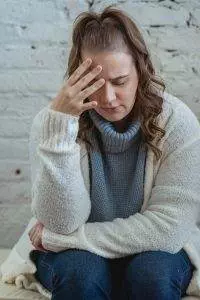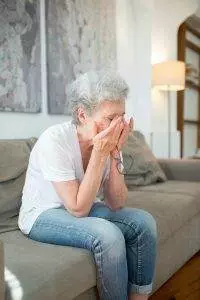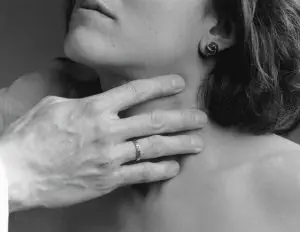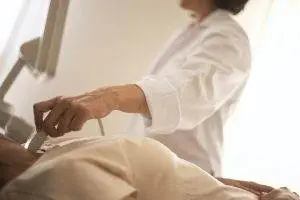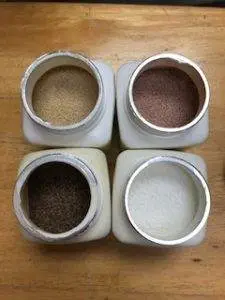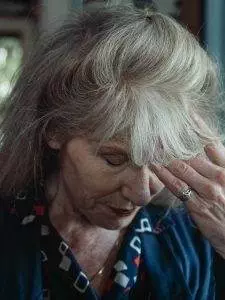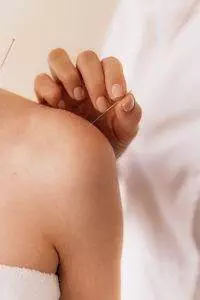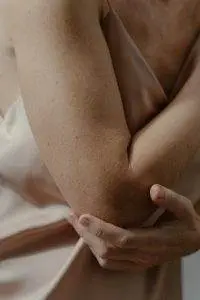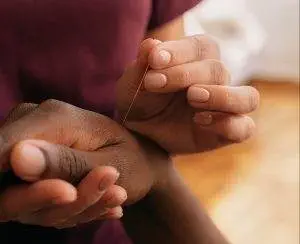By Qineng Tan, L.Ac., Ph.D. and Xiaomei Cai, L.Ac., Ph.D.

Joint hypermobility? Bone pain? Bruise easily? Thin skin? These can be signs of Ehlers-Danlos Syndrome (EDS), which is a connective tissue disease. Acupuncture and TCM can help relieve Ehlers Danlos symptoms.
EDS, sometimes referred to as Ehlers Disease, is a relatively rare genetic condition that causes people to have weak connective tissues. Most types of Ehlers-Danlos are inherited, meaning that a person’s parents carry a pathogenic variant of a gene. This genetic mutation affects the way the body makes collagen proteins.
What are connective tissue disorders? Connective tissues maintain the structure of the internal organs of the body, supporting them and holding them together. These include bones, muscles, fat tissue, blood vessels, and other tissues in the body. A connective tissue disorder occurs when there is something unusual about the way connective tissues are formed.
Connective tissue is made up of collagen and elastin. In Ehler’s disease, a genetic mutation causes problems with a person’s collagen production.
When a person has EDS tissue disorder, their body does not metabolize or process collagen normally, which can have a profound effect on the way tissues in the body develop, heal, and age over time. Ehlers-Danlos can affect a person’s skin, muscles, bones, cartilage, joints, blood vessels, or fat tissue.
EDS bears some similarities to another genetic condition known as Marfan syndrome, or Marfan connective tissue disorder. In Marfan’s syndrome, there is a problem with the fibrillin-1 gene, which affects the production of elastic fibers that help make up connective tissues in the body. People with Marfan syndrome tend to be taller, have long limbs, and may have heart problems or lung problems. Some Marfan symptoms may overlap with those of EDS, but they are two distinct disorders.
How Many Types of EDS Are There?
There are several different types of Ehlers-Danlos syndrome, caused by genetic changes that affect various connective tissues in the body.
Thirteen different types of EDS have been identified. The criteria for each type can help doctors diagnose people with Ehlers-Danlos, so that they can get the most complete understanding of their symptoms and needs. There is a lot of overlap between types, so a person may have symptoms that fit into several of these types of EDS.
13 Types of Ehlers-Danlos Syndrome (EDS) include:
- Hypermobile EDS (hEDS) – characterized by hypermobile joints, joint instability, and chronic joint pain
- Classical EDS (cEDS) – usually stretchy skin, “velvety” skin, fragile skin, scars easily
- Vascular EDS (vEDS) – bruises easily, fragile blood vessels, fragile organs that bleed easily, visible veins, varicose veins, thin skin, prominent eyes
- Periodontal EDS (pEDS) – bleeding gums, early tooth loss, missing permanent teeth, small teeth, smaller than usual jaw
- Kyphoscoliosis – or Kyphoscoliotic Ehlers-Danlos syndrome, curve of the upper spine causes a hunch, “floppy baby,” developmental delays, difficulties with walking
- Arthrochalasia – may involve hip dysplasia or deformity of the hip joint, dislocated hip, general joint instability, speech or reading problems, echolalia (repeating other’s speech), femoral hernia, or inguinal hernia
- Classical-like EDS (clEDS) – soft, stretchy skin, joint hypermobility with dislocations occurring, and frequent bruising
- Cardiac-valvular EDS (cvEDS) – severe heart valve problems, thin skin, joint hypermobility
- Dermatosparaxis EDS (dEDS) – extremely fragile skin, loose skin, extra folds of skin, severe bruising, hernias of internal organs
- Brittle Cornea Syndrome (BCS) – thin corneas that may rupture
- Spondylodysplastic EDS (spEDS) – shorter than average stature, bowed limbs, decreased muscle tone
- Musculocontractural EDS (mcEDS) – birth defects – clubfoot or adducted thumb, whites of eyes are a bluish color, testes do not descend, malformed ears, high palate, muscle weakness, delayed motor skills, scoliosis, narrow fingers, skin infections
- Myopathic EDS (mEDS) – muscle weakness, joint contractures, limited range of motion
Top 10 Symptoms of Ehlers-Danlos Syndrome
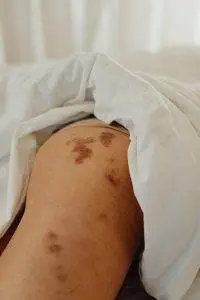
Signs of EDS vary widely, because there are several different types of Ehlers-Danlos, and because each individual will experience this syndrome differently.
Symptoms that common to many people with EDS include:
- Joint instability, “loose” joints, hypermobile joints, hyperflexibility, “double jointed”
- Thin skin, stretchy skin
- Bruises easily, bruises often
- Red marks on skin from impressions last a long time and are more prominent
- Scarring, wounds take a long time to heal
- Joint pain
- Muscle pain
- Bone pain
- Fatigue, tired all the time
- Difficulty concentrating
- Heart murmur, problems with “floppy” heart valves
- Dizziness when standing up (similar to POTS, may occur concurrently with POTS)
- Double follicles, multiple hairs growing from one follicle
- Brittle nails
People with hypermobility EDS may also experience urinary incontinence, constipation, heartburn/acid reflux, and high blood pressure.
People with EDS are often observed to have certain characteristic facial features, including: large eyes, small eyebrows, a thin nose, prominent cheekbones, and small or no earlobes.
Some people have hypermobile joints, which can cause pain and other problems, but do not have any of the other symptoms of EDS.
Treatment for Ehlers-Danlos Syndrome
Unfortunately, many people have a difficult time getting a diagnosis of EDS. Because the symptoms often show up in so many different organ systems and parts of the body, it can be confusing for health care providers to figure out what is going on. Patients will often be diagnosed with conditions like chronic fatigue syndrome or fibromyalgia instead of a connective tissue disorder.
There is no set medical treatment protocol for patients with EDS. If a person is having cardiovascular symptoms, they may be prescribed medications like beta blockers to manage blood pressure and heart rate.
People with EDS who have hypermobile joints may be recommended for physical therapy, occupational therapy, and/or cognitive behavioral therapy. to help them maintain stability and prevent dislocations. Wearing braces to protect joints may be recommended, as well.
Chronic pain may be helped with pain medications or kinesio-taping.
Acupuncture and other TCM treatments can be effective as an alternative treatment for Ehlers-Danlos, by helping to manage chronic pain and also addressing other symptoms of EDS.
Can Acupuncture Help Ehlers-Danlos Syndrome?
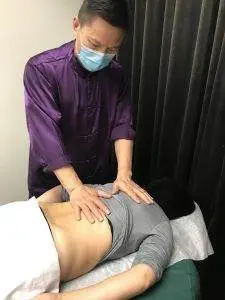
TCM is an excellent modality for treating complex syndromes and autoimmune disorders because it is a holistic form of medicine that takes the whole person into consideration, addressing myriad symptoms that may seem unrelated in the context of conventional medicine.
Many, if not most, people suffering from EDS, have probably struggled to find doctors who are willing to listen and acknowledge their condition. TCM practitioners are trained to observe carefully and look at the whole picture. They typically spend much more time listening and asking questions so that they can understand all of the different symptoms a person is experiencing. This, in itself, can help people with difficult-to-treat conditions feel heard and validated.
Acupuncture treatment can not only help reduce pain sensations, but can actually help to stimulate muscles and connective tissues, reducing inflammation and toning the muscles to help improve joint stability. Acupuncture can help to facilitate the healing of old injuries or wounds that cause chronic pain because they have never been able to heal completely.
Acupuncture treatment has been shown to have a positive effect on connective tissues; the rotation and manipulation of the fine acupuncture needles directly stimulates cells beneath the skin.
Other TCM modalities, like Tuina massage, can also promote relaxation and stimulate muscle tone.
Acupuncture can help to improve sleep quality and mental health, relieving symptoms of anxiety and depression.
Acupuncture can help to treat many different connective tissue disorders besides EDS, including:
Acupuncture Near Me for Ehlers-Danlos Syndrome – Los Angeles
Acupuncture can be used as an adjunct or alternative treatment for EDS and many other difficult-to-treat conditions, like autoimmune diseases and connective tissues disorders. Drs. Tan and Cai at Art of Wellness Acupuncture and TCM in West L.A. have over 30 years of experience helping patients with chronic pain conditions, muscle weakness and pain. If you or someone you know has been diagnosed with EDS or suspect you may have Ehlers-Danlos, please consider scheduling an appointment for an in-depth consultation. We can help.
*This article is for education from the perspective of Traditional Chinese Medicine only. The education provided by this article is not approved by FDA to diagnose, prevent, treat and cure human diseases. It should not stop you from consulting with your physician for your medical conditions. Traditional Chinese Medicine is based on Qi, which is an invisible force that usually cannot be observed by modern science. Because science focuses on testing ideas about the natural world with evidence obtained through observation, these aspects of acupuncture can’t be studied by science. Therefore acupuncture and Chinese herbs are often not supported by double-blind, randomized trials, and they are considered alternative medicine therapies in the United States.
